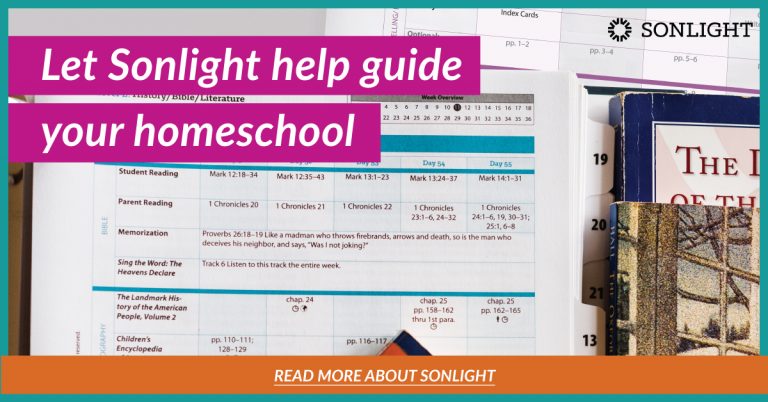
"Sonlight keeps our family learning together. The beautifully illustrated books capture the attention of our wide age range of children and make homeschooling more enjoyable for the parent as well. With Sonlight's grab-and-go Instructor's Guides, it's easy for Dad to do a quick lesson before bed. Sonlight is the perfect family curriculum."
Mackenzie B. of Morristown, AZ
1. Good boy.
My son finishes his writing work and I reward him with a “Good boy.” On the face of it, this phrase is a congratulation of his moral goodness, reflected in diligence.
But the phrase actually winds up communicating something less straight-forward. He is not really hearing an appraisal of his performance, he is hearing an approval of his person.
The problem is that personal approval should be completely independent of performance.
Gospel-powered parenting means cherishing my son even before he is morally good: especially before he is morally good. He is good before and throughout his failure. He becomes worthy of approval when he knows he need not win that approval.
An alternative: "I’m so impressed with how hard you worked on that."
2. What did I just say?
“...And that agreement was called the Magna Carta. Are you listening? What did I just say?”
“Something about an apple carton.”
Trying to control a child’s attention is like chasing the wind. We cannot grasp at it, but we can set up a windmill. To put it more familiarly, we lay the feast and send out the invitations, but we don’t decide what gets digested.
It may be that I’m sad about my daughter's underdeveloped attentiveness, but it’s actually more likely that I’m annoyed at having to repeat that part of the text.
It’s only natural to try and control my child’s attention, and I may be able to capture it, but it won’t be held prisoner for very long. When I hear myself telling them to listen too often, I remind myself that the only sure way to secure attention, is to provide worthy objects for it.
An alternative: "It frustrates me that you didn’t hear that, and I don’t want to repeat it right now."
3. Act your age.
I have found out (the hard way) that, just as stomachs don’t respond well to commands about digestion, nor ears about attention, maturity doesn’t respond well to commands about attitude.
Kids don’t grow up because you tell them to; they grow up when they’re fed and exercised.
My son blows bubbles in his milk and gets some on the carpet, rather than putting it in the kitchen like I asked. At my worst, what I mean by, "Act your age," is, "I’m angry at you because I have to clear up the milk." Quite often, however, I mean something like "I wish you would have spontaneously cleared up the milk." In other words, I want him to do what’s right because it’s right rather than because I tell him to do it. The irony, therefore, is when I tell him to, "Act his age," I’m telling him to be the kind of person that doesn’t need telling. I’m providing external motivation for internal motivation, which is as impossible as it sounds.
An alternative: "I’m not happy with the way you’ve handled this. It means I have to clear up the milk, which I hate doing."
4. What’s your favorite subject?
It’s okay to have a favorite subject. It’s okay to enjoy one subject in particular, and to be talented at it. But how much do I care about the answer to this question, and why? Does it matter if the answer is nothing?
The freedom to follow your interests, is touted as one of the benefits of home education, but this may be putting the cart before the horse. I study mechanical engineering first and foremost because I want to help people and serve God. Talent and interest are part of the decision-making process, but sometimes we study things we find counter-intuitive and frustrating, rather than capitalizing on our talents. Let us be personality-sensitive, but not personality-driven.
An alternative: "It’s such a joy to see that you’ve taken to these grammar exercises. I’m looking forward to trying some painting with you."
5. Look how your sister is doing her work nicely.
Consider the moral reasoning here. I’m arguing that one child should do his work because of how embarrassing it would be to be inferior to a sibling. Should it be embarrassing to do less than your sister? If it is, it should not be the motivation for learning.
The fact is–being motivated by measuring up to others is a very straight-forward vice. It is envy.
Don’t be the schemer Rebekah, who had her son dress as Esau to win the approval of the father Isaac (Genesis 27). Vapid imitation turns to boiling resentment, and resentment to feuds. It doesn’t matter what your sister is doing: do what the Lord has asked of you.
An alternative: "[Sister’s name], it looks like you’re making great progress with that writing. I can see you really blessing people with that skill."
Well-intentioned though these first sayings are, when I hear myself say them, I take it as a cue to examine myself. Instead of defaulting to phrases that have disparaging or embarrassing undertones, I want to specifically choose words that build up my little students and infuse gospel power into our homeschool life.
Sonlight Instructor's Guides include complete lesson plans and notes for the entire year.







